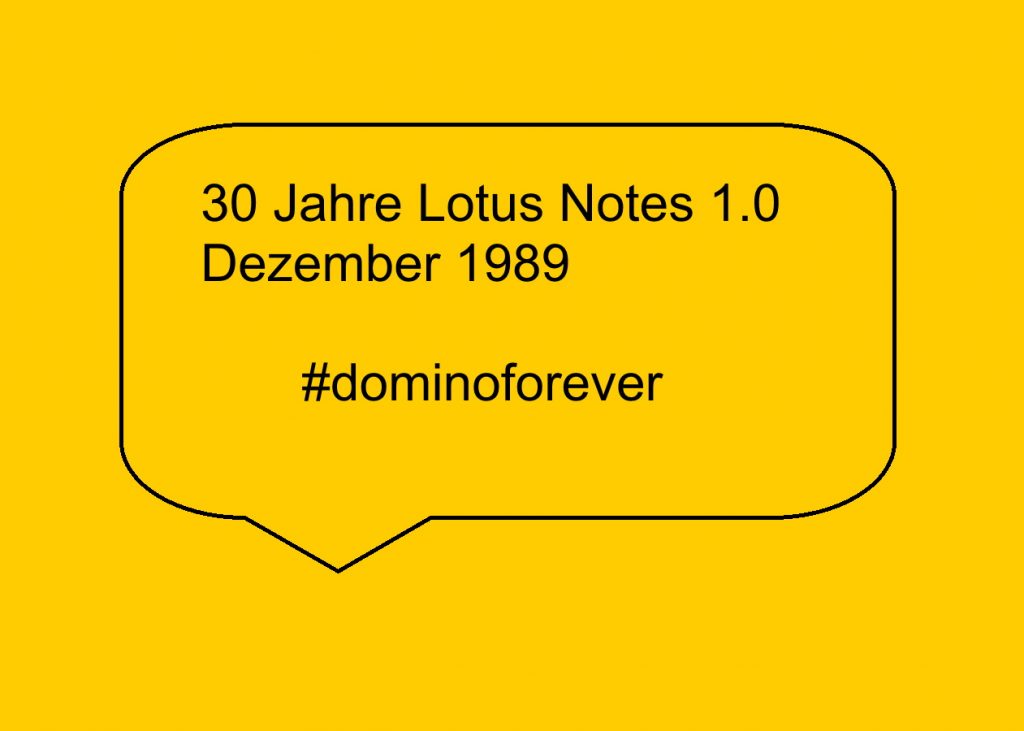#dominoforever – HCL Notes Domino takes off
Since the takeover of Notes Domino by HCL Technologies, the well-tried database system Notes Domino (formerly Lotus Notes) has really taken off! HCL Technologies is an IT services company based in India. It is a multi-billion dollar IT company that now employs over 140,000 people in 44 countries. The takeover of IBM software products, including sales and marketing, was completed in the summer of 2019.
Due to a current trend, the whole thing is picking up speed, as many companies are increasingly relying on their own solutions and developments, which is the core competence of Notes Domino. The clear advantage here is the independence and cost savings that a company can achieve.
December 2019: 30 years Lotus Notes
Unbelievable, but true: Exactly 30 years ago in December 1989 the first version Lotus Notes 1.0 was released. Much has happened since then and meanwhile numerous updates have been released. December 2019 is HCL Domino V11 (worldwide release on December 04, 2019 in Tokyo). From the beginning, the advantage of Notes applications was that they could be developed quickly, inexpensively and with little effort. This is a huge advantage, because Notes is ideally adaptable to the individual needs of each company. In addition, the Notes applications can be extended very flexibly. This is particularly important in today’s fast-changing world, where business processes have to be continually adapted and, above all, accelerated.
Outlook for the future – Domino V11
Since the acquisition of HCL, we can really look to the future with great optimism, because HCL works intensively on the further development of Notes Domino. The focus here is on keeping application development (keyword low code) flexible. In addition, all user interfaces should be modern, browser-oriented and adapted for use on smartphones. Another important point is the convenient container technology and data security. One thing is certain: The Domino Server always works reliably and securely. And V11 additionally emphasizes what was most important to most users about Notes Domino and that is its use as an application development platform for everyone. It is possible to develop applications very quickly and easily.
While the Notes Domino version V10 focused more on the server and application development (repair tool, Domino Query Language, Appdev-Pack), V11 will focus on the front-end. There will be some changes to the user interface. With the version 11 also Nomad for iPhones and Android should come and later also a new browser-based Low Code Builder. But the focus is on the new user interface. Since V10 you can also program with JavaScript in addition to LotusScript, which suits many younger developers.
What are the advantages of Notes Domino?
The advantage of Notes Domino is that alternatives such as open source solutions for developers sometimes have weaknesses in data security, offline availability and replication options. Domino, on the other hand, is a cost-effective solution that offers a great deal. In addition, one remains independent of Microsoft and is not subject to the Microsoft license model.
It is also important that Notes customers who have not carried out maintenance for a long time can sign a maintenance contract again at any time without incurring maintenance fees or having to purchase the license a second time. (Only an inflation compensation will be added). In addition, the many different license models that existed at IBM have been significantly reduced and simplified.
Another advantage: Notes Domino concentrates on its target group and offers a correspondingly high added value. The main target groups are both “professionals”, simple users from specialist departments (without great programming skills) and classic Notes developers.
More information about Domino V11 in Tom Zeizel’s HCL Blog (DNUG):
DNUG is the German Notes User Group, the German association of HCL users. The goal of the User Association as an association is not only the contact to the manufacturer HCL but also the exchange of experiences and of course the organization of events (#dnug47, HCL & DNUG Community Meeting Dresden), professional groups and the promotion of young talents. On the DNUG website you will find all important information and dates. In addition, the blog regularly provides detailed information on the topic. Author of the blog is Tom Zeizel, former Business Unit Executive IBM Watson Collaboration, now Head of HCL Software in the DACH region.

